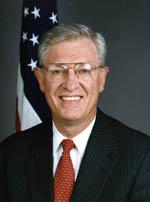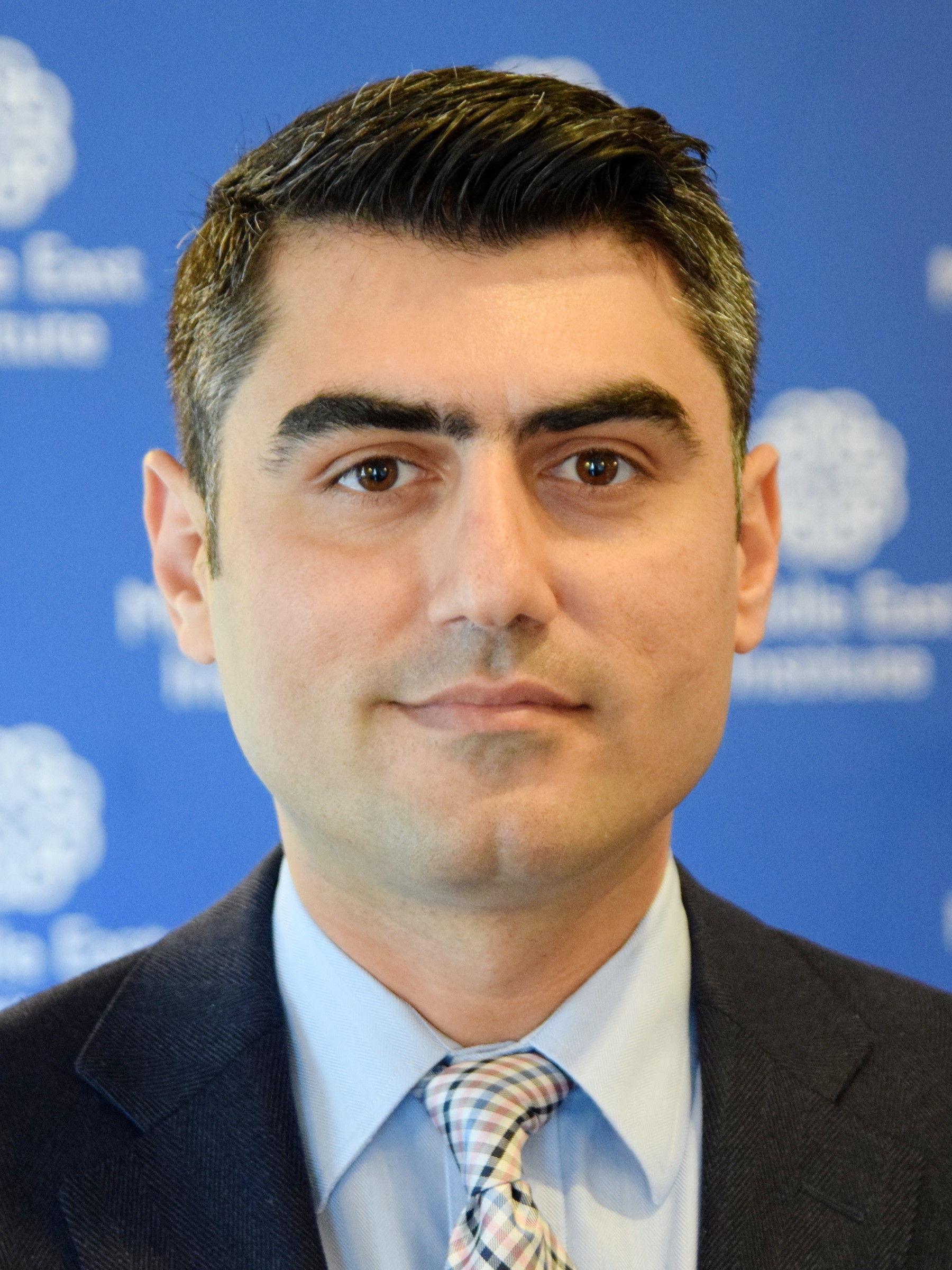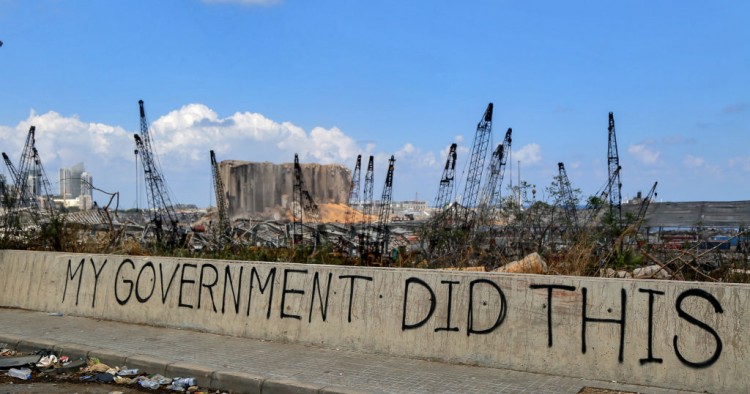This week's briefing on recent news and upcoming events in the region featuring Randa Slim, Alex Vatanka, Mirette F. Mabrouk, Marvin G. Weinbaum, W. Robert Pearson, and Rauf Mammadov.
Lebanon’s moment of reckoning
Randa Slim
Senior Fellow, Director of Conflict Resolution and Track II Dialogues program

Lebanon’s stability is under more threat now than it has been at any point since the end of the civil war in 1990. The massive explosion at the Beirut port on Aug. 4 that killed hundreds, injured thousands, and caused material damage in the billions of dollars has not only scarred people physically and psychologically, it has also altered the frames of reference for the country’s opposing political forces. The political contestation has taken on an existential dimension. To the parties calling for an overhaul of the oligarchy that has ruled Lebanon since the signing of the Taif Agreement in 1989, the political elites have not only impoverished them, they are now accusing them of criminal negligence for causing the explosion. To the pro-regime camp, led by Hezbollah, this contestation is about upending a political system that since 1989 has co-existed with, and even legitimized, Hezbollah’s military arsenal. Overhaul is codeword for disarming Hezbollah, which they will resist at any cost, even if it means plunging the country once again into civil strife.
A repeat of the scenario of Syria in 2011-12 is being discussed in pro-Hezbollah circles — a non-violent protest movement calling for a regime overhaul whose agenda for freedom and dignity gets appropriated by regional actors, turning the country into a proxy theater for regional and international power competition. The internal conflict dynamics that existed in Syria in 2011-12 exist in Lebanon today: a civil, non-violent, albeit disorganized, opposition that sees the political elites as a threat to their physical survival is facing a system that has a military arsenal and is willing to fight for its survival. In the case of Lebanon, however, it is not the Lebanese state that has the military arsenal. It is Hezbollah.
The major difference between Syria in 2011-12 and Lebanon today that can serve as a deterrent to the scenario described above is that regional dynamics are less amenable to it. Countries on both sides of the regional divide are dealing with public health challenges, facing dire economic futures, and are not incentivized to invest in another conflict, having drawn hard lessons from citizen uprisings that have taken place since 2010. The international community is preoccupied with domestic challenges and is not interested in seeing another failed state on the Mediterranean. However, so far the international response has been disappointing. The aid conference co-convened last Sunday by France and the UN fell far short of Lebanese expectations. The pledges in the amount of $296.71 million made by participating countries were nowhere close to meeting reconstruction needs, and the final statement called for assistance for an “impartial, credible and independent inquiry on the explosion of August 4th… upon the request of Lebanon,” thus conceding to the Lebanese president’s rejection of an international investigation of the explosion.
Given the unequal power equation between the opposing camps, the protest movement cannot force the kind of transformative change it seeks. There is not a non-violent path to force the pro-regime camp to agree to this change. Moreover, none of the political and economic elites, including those opposed to Hezbollah, are interested in effecting this kind of transformative change.
Lebanon faces one of two scenarios: A muddle through scenario involving a negotiated process among the conflicting parties, resulting in stabilization of the political and economic conditions without a restructuring of the current rules of the game. The political and economic elites agree to some concessions, primarily in the economic arena along the lines demanded by the International Monetary Fund. In the political arena, they agree to a new technocratic government that will not be much different from the one that just resigned. They also agree to early elections, seeing in them another means to re-legitimize the status quo that favors them. None of these concessions will upend the status quo. The opposition camp plays the long game, pushing for economic reforms and focusing on getting a new election law passed that would increases opportunities, especially for independent civil society actors, to contest the political space more effectively than they have done to-date. This requires that the different opposition groups unite around a common leadership and platform. So far this has not happened and there is still infighting in their midst.
The second scenario involves a perpetuation of political and economic instability, with the opposing camps holding their ground, the country continuing its descent into political and economic disintegration, increased calls for different parts of the country to go their own way, large parts of Beirut remaining destroyed, an ineffective central government, a state that continues to be hollowed out, and emigration en masse of skilled Lebanese.
The only ray of light from last week’s humanitarian disaster lies in the response of the Lebanese, rising to action and taking it upon themselves to come to each other’s aid, clearing debris from their streets and providing food and shelter to the hundreds of thousands rendered homeless by the explosion. This collective action contrasts with that of the government, which was nowhere to be seen managing and coordinating the response to the disaster.
A new special envoy, but will it affect US Iran policy?
Alex Vatanka
Director of Iran Program and Senior Fellow, Frontier Europe Initiative

After two years in the job, Brian Hook has announced his departure as President Donald Trump’s special envoy on Iran. In Washington, pundits have been quick to draw some big conclusions from Hook’s departure and the track record of his successor in the role. Hook will be replaced by Elliott Abrams, a long-time hawkish foreign policy figure who also happens to have held the role of Trump’s special representative on Venezuela since January 2019. Given Abrams’ firm credentials as an advocate of regime change in Tehran as the only remedy to the long-standing U.S.-Iran standoff, there is understandably a sense that the Trump administration may soon turn more forcefully against Iran under Abrams’ steering. Hook, after all, is a mainstream Republican who wanted to look for a way to cut a deal with the Islamic Republic.
Abrams, considered a prominent neoconservative, still believes in the virtues of muscular U.S. foreign policy posturing, including military interventions and the pursuit of regime change. Only time will tell if his arrival will make much of a difference to the Trump administration’s Iran policy, but to begin with his window of opportunity is limited, running from now until the U.S. elections in November. The Iran policy of both a re-elected Trump or a Joe Biden presidency will very likely be quite different than the “maximum pressure” campaign launched in May 2018.
This is what we know for sure. Despite the punditry in Washington, Abrams’ arrival has not raised alarms in Tehran. The Iranians expect policy continuity and that the most that Abrams can muster, despite his long-held aversion toward the clerical system in Iran, is to push for a more extensive campaign of sabotage inside Iran, which the Iranians believe has been under way for some time anyway. In other words, Tehran does not expect any game-changing policies. As evidence, it looks at Abrams’ track record in Venezuela and how Trump kept him on a short leash on the question of a forceful intervention in that country. Tehran sees that as more evidence that Trump remains reluctant to be sucked into any risky major foreign policy venture.
The dimming prospects for GERD talks
Mirette F. Mabrouk
Senior Fellow, Director of Egypt program

During the long-drawn-out negotiations over the Grand Ethiopian Renaissance Dam (GERD), Sudan has traditionally been perceived as the most easy-going of the parties, as compared to Egypt and Ethiopia. However, apparently there are limits to even the legendary Sudanese relaxed and forgiving nature.
On Aug. 9, Al-Arabiya TV announced that Sudan had declared that it would boycott the next round of negotiations sponsored by the African Union (AU), scheduled for Aug. 10, due to to “Ethiopia’s failure to adhere to the meeting’s predetermined agenda.” However, one can only assume that there must have been some serious diplomatic wrangling because sources say that both Sudan and Egypt are apparently attending the talks.
The first round of AU-sponsored talks finished last month and was followed by a plenary review, at the head of state level, on July 21. There had been some hope that the negotiations might overcome the sticking points; a statement from the office of South African President Cyril Ramaphosa — South Africa is the current head of the AU — said that they had “agreed on the process of finalizing negotiations on the text of a binding agreement on the filling and operation of GERD, which include a comprehensive agreement on future development on the Blue Nile river.” That statement was promptly scotched soon after by Ethiopia’s response, to an Emirati paper, that flatly contradicted it, saying that “The Ethiopian government does not look for a binding agreement concerning the current talks about GERD, only a guidelines agreement which can be revised at any time.” That has been a major sticking point in the negotiations: Egypt and Sudan want binding dispute mechanisms in the case of a drought and Ethiopia has refused.
Ethiopia then appeared to up the ante by presenting a new proposal to the AU, on the morning of the negotiations on Aug. 4, which then had to be postponed while Egypt and Sudan scrambled to read the new proposal. Both countries had objections; Egypt’s were that the new proposal didn’t adequately address the filling and operation, wasn’t binding, and failed to provide the vital dispute mechanisms. Sudan saw Egypt’s objections and raised them, refusing the surprise addition of a water sharing agreement with other Nile Basin countries. That last addition was particularly surprising since Ethiopia has said from day one that it flatly refused any suggestion that an agreement over the GERD be a water sharing one.
There are reasons why Sudanese negotiators (and Egyptian ones) object to the new basin water sharing agreement stipulation. There are two other agreements in play. The first is the 1999 Nile Basin Initiative (NBI), an intergovernmental partnership of 10 countries (including Egypt, Ethiopia, and Sudan) set up to “provide a forum for consultation and coordination among the Basin States for the sustainable management and development of the shared Nile Basin water and related resources for win-win benefits.” Its stated desire for Nile Basin water sharing aside, Ethiopia has refused to include GERD in any NBI cooperative agreements. The second is the Cooperative Framework Agreement, which has been described as both “contentious” and “divisive”; that agreement has notably not been ratified by the downstream countries, including the Democratic Republic of the Congo, Egypt, Sudan, and South Sudan. One Egyptian negotiator, with no apparent pun intended, said the new water sharing stipulation was “merely an attempt to muddy the waters.”
While the decade-long negotiations have been largely fruitless and increasingly acrimonious, they have often been incorrectly presented a face-off between Egypt and Ethiopia, with Sudan, which has as almost as much to gain as it does to lose from the GERD, in terms of cheap electricity and flood regulation, playing a more conciliatory role. That role has increasingly come under strain. Last month, both Egypt and Sudan sent formal objections to Ethiopia’s unilateral decision to complete the first stage of the dam filling. Ethiopian statements that the filling was a natural condition due to the rains and the stage of the dam’s construction were rather undermined by comments from the Ethiopian foreign minister, Gedu Andargachew, who tweeted “previously it was the Nile River, now it is a lake. It is ours.”
The alienation of Sudan is a further sign of the deterioration of the talks. At this stage, any chance of a mutually profitable agreement is dimming by the day. It was always going to be a delicate act, balancing Ethiopia’s legitimate right to development with Egypt and Sudan’s equally legitimate right to avoid serious harm from a water shortage. While mitigation appears the best possible outcome, that requires that the parties at least be on the same page.
Pakistan’s troubled borders
Marvin G. Weinbaum
Director for Afghanistan and Pakistan Studies

Much has changed in Pakistan over its 73-year existence, but one constant has been its fraught relationship with its eastern and western neighbors, India and Afghanistan. With both countries, there remain festering border issues and concern over the perceived threats to Pakistan’s territorial integrity and national security. Recently, tensions have flared anew across the disputed Durand Line dividing Pakistan and Afghanistan, and the Line of Control separating Pakistani- and Indian-held Kashmir.
Over the last several months, Pakistan, citing the COVID-19 pandemic, has periodically closed a major border crossing with Afghanistan at Chaman/Spin Boldak, halting most foot traffic. With hundreds demonstrating and sit-ins, on July 31, Pakistani troops fired on Afghan civilians, reportedly killing 15 and wounding 80 others. Meanwhile, further north along the frontier, artillery and mortar exchanges leading to multiple casualties have become a regular affair. Ungoverned areas of Afghanistan’s northeast provinces are known to harbor expelled Pakistani Taliban fighters who infiltrate back into Pakistan, as well as provide a safe haven for followers of Islamic State-Khorasan Province and al-Qaeda. Over Afghan objection, Pakistan has been constructing a border fence aimed at slowing, if not stopping, crossing by militants and refugees. To Afghanistan, this fence represents another effort by Pakistan to establish the permanence of the Durand Line.
Pakistan’s determination to secure its western border cannot be separated from fears over India’s gaining strategic advantage through influence in Afghanistan. But for Pakistan, its eastern front has always presented a more direct threat. Firings across the Line of Control have been a fact of life for much of the last 30-plus years. So far this year, Pakistan accuses Indian troops of having committed 1,877 cease-fire violations, killing 14, mostly civilians, and injuring 144, half of them women and children. (For its part, India claims Pakistan has committed over 2,000 violations.) Over this past year, bilateral relations between the two nuclear-armed nations reached a new low diplomatically following the revocation of article 370 of the Indian constitution. This action by Prime Minister Narendra Modi, which took away the special status of Jammu and Kashmir and absorbed it within the Indian union, has effectively put beyond reach a political solution to the Kashmir issue and left Pakistan frustrated. To further poison relations, on Aug. 5 ultra-nationalist Modi laid the cornerstone of a Hindu temple in the city of Ayodhya on the site of what had been the Babri Masjid, demolished by a Hindu mob in 1992.
The significance of Pakistan’s borders goes beyond concern over the well-being of Kashmiri Muslims or securing the border with Afghanistan. Both issues are tied up with retaining the identity and unity of Pakistan as a nation. More prosaically, at present they also offer a convenient distraction for a Khan government beset with domestic political challenges and a health crisis.
This article was co-authored by Sawera Khan, Hamid Safi, and Jack Stewart, research assistants to Marvin G. Weinbaum.
Turkey’s sick economy
W. Robert Pearson
MEI Scholar

Turkey should be a great economy. The country has a large population, a well-educated public, excellent climate, vast resources except for gas and oil, a central location for commerce, transport and communication with Europe, Russia, Africa, and the Middle East, and a commendable ethic of hard work and deferred gratification.
However, its economy suffers from serious structural problems, underutilization of its labor force, a government-controlled central bank, inadequate financial reserves, high unemployment, and a devotion to inflationary credit. The current account deficit is wide, tourism is hurting, and the pandemic will depress earnings going forward. Foreign direct investment levels remain low, workforce participation is well below the OECD average, and popular anger at the government’s economic failures is widespread, including among supporters of the ruling party.
As a result, the Turkish lira is sinking to new lows, now to less than one-half its value three years ago. The U.S. government shows no sign of interest in rescuing the lira, and borrowing dollars at nearly zero interest rates may do more harm than good if the Turkish economy cannot earn enough to repay those loans. Raising interest rates will hurt production and consumption in the short run and be unpopular. One wonders why there is not more popular pressure even within the ruling party to make better decisions. After all, not so long ago, in the early 2000s, the current government rode to victory following an economic collapse precipitated by a widening current account deficit.
Part of the answer is political. Turks may remember that the coalition governments of the 20th century never delivered the wealth produced in the early years of the Justice and Development Party rule. Today there is no visible opposition coalition that represents convincing leadership for the country. Moreover, a genuine economic reform program to repair the structural failings would be wrenching. Many Turks, including perhaps some among the country’s leading businesses, would prefer to avoid that pain until the next major economic crisis appears. In the meantime, the life force of Turkey’s economy continues to ebb.
Rising tensions in the eastern Mediterranean
Rauf Mammadov
MEI Scholar

Tensions in the eastern Mediterranean rose again last week with the announcement of a maritime agreement between Greece and Egypt signed on Aug. 6. Turkey was quick to respond, with President Recep Tayyip Erdogan announcing the same day that a seismic survey vessel owned by the Turkish Petroleum Corporation (TPAO), Barbaros Hayreddin Pasa, would resume its exploration efforts in the contested waters following a two-week break. On July 21, TPAO withdrew its seismic survey vessel, Oruc Reis, to Antalya port and halted the operations of Barbaros Hayreddin Pasa following German Chancellor Angela Merkel's intervention to find a political solution to the problem.
The point of contention between the two NATO members is Turkey's exploration activities in the waters of the eastern Mediterranean to the west of Cyprus. TPAO has yet to reveal any official figures regarding the reserve estimates. There have been multiple reports, mainly from Greek sources, on a discovery made by TPAO in Block 3, which was initially awarded by Cyprus to Italy’s ENI. Another report said Turkey had discovered 170 billion cubic meters of gas in the explored area, but the Turkish side has never confirmed these reports.
Turkey faces an uphill battle in the eastern Mediterranean, relying on geopolitical maneuvring and its only ally: Libya's Government of National Accord (GNA). Ankara signed a maritime agreement with the U.N.-recognized GNA last November. All of the other eastern Mediterranean states (Egypt, Greece, Israel, Italy, and the Palestinian Authority) absent Lebanon, which has an ongoing demarcation dispute with Israel, have created an opposing front through the establishment of the East Med Gas Forum and the signing of various multilateral and bilateral maritime agreements. In addition to Egypt, Greece has also signed a maritime agreement with Italy to demarcate the exclusive economic zones in the Ionian Sea.
The eastern Mediterranean has long been an irritant in relations between Turkey and Greece, but its emergence as a natural-gas rich region has added another dimension to an already complex international dispute. The discovery of significant gas fields in Israeli and Cypriot territorial waters — Leviathan, Tamar, and Aphrodite — has transformed the region’s energy geopolitics, making these formerly import-dependent states exporters. It also added value to the region as a potential source for diversifying the EU's gas imports.
Photo by Marwan Naamani/picture alliance via Getty Images
The Middle East Institute (MEI) is an independent, non-partisan, non-for-profit, educational organization. It does not engage in advocacy and its scholars’ opinions are their own. MEI welcomes financial donations, but retains sole editorial control over its work and its publications reflect only the authors’ views. For a listing of MEI donors, please click here.













